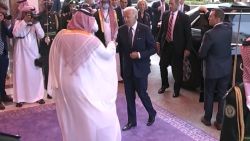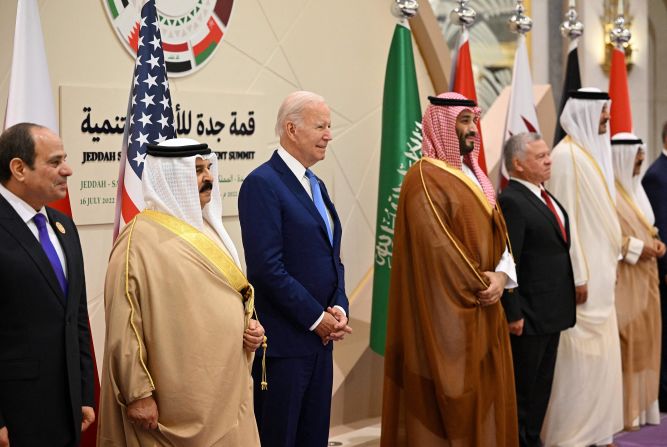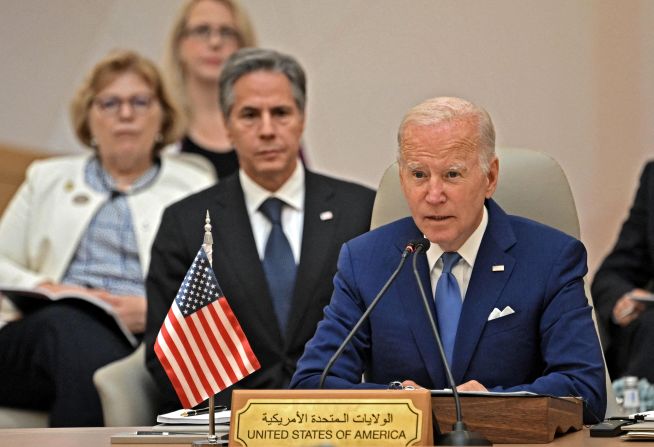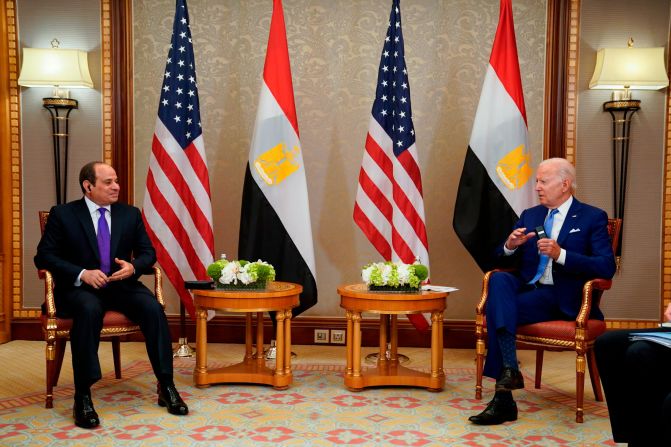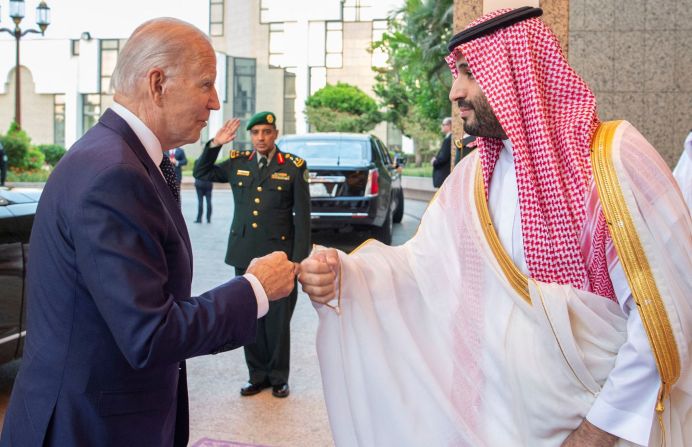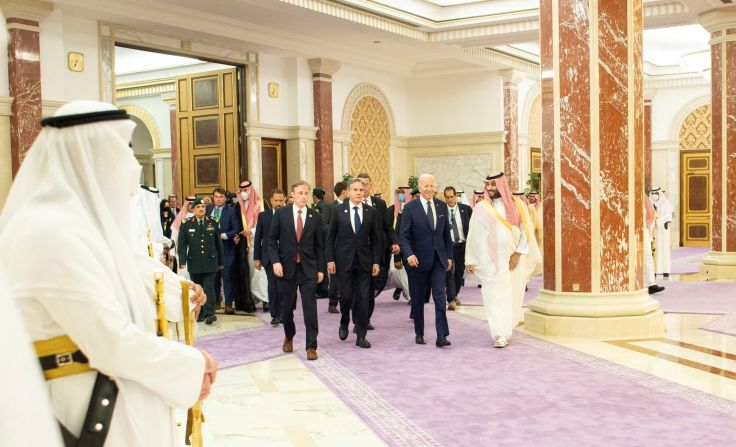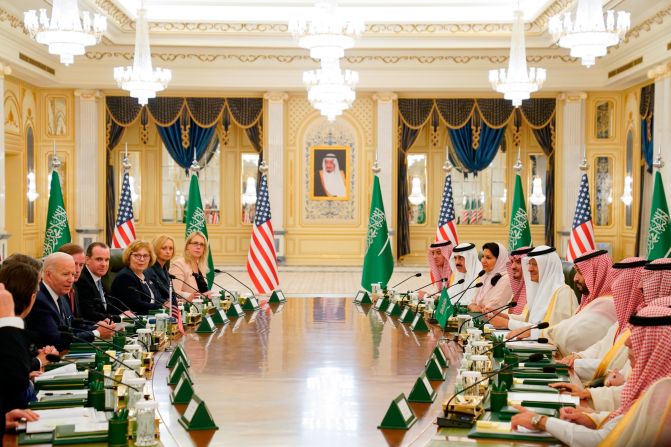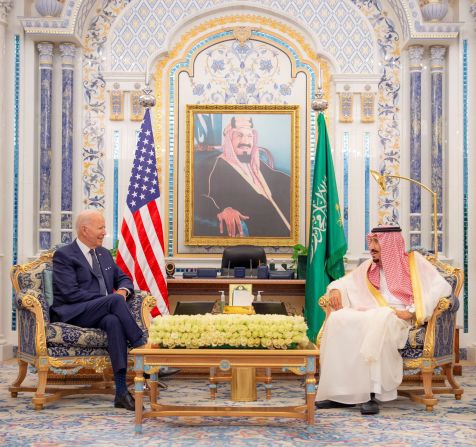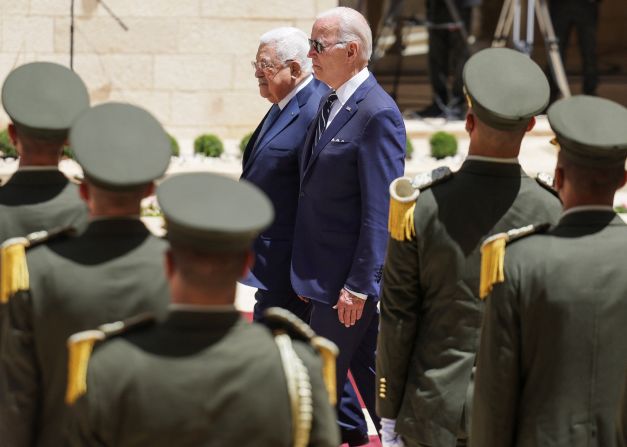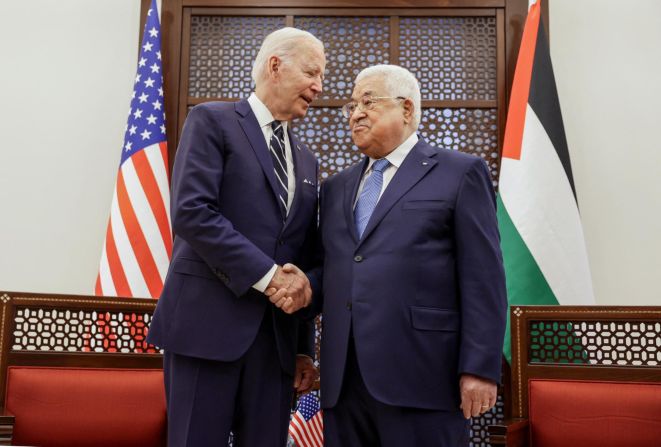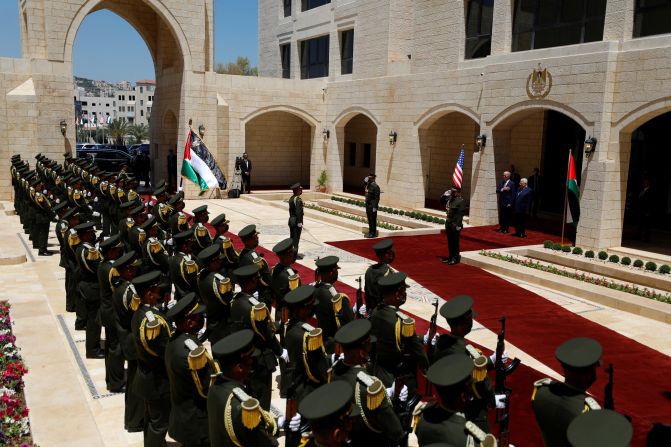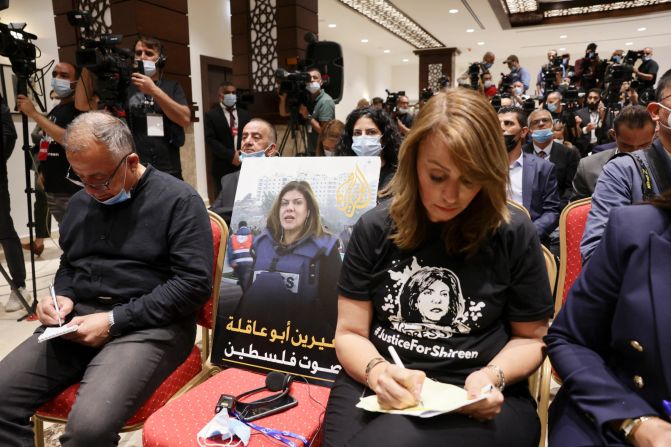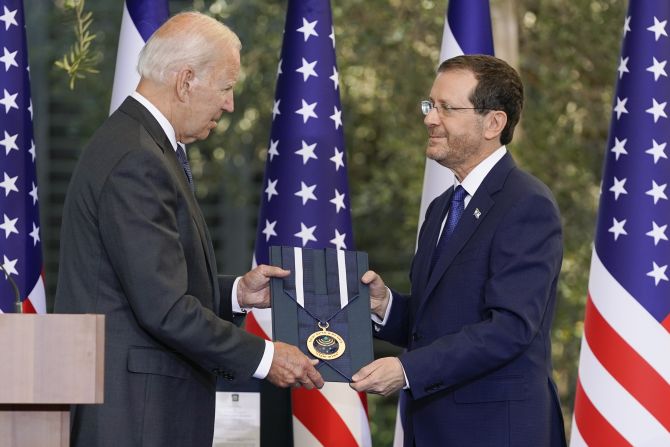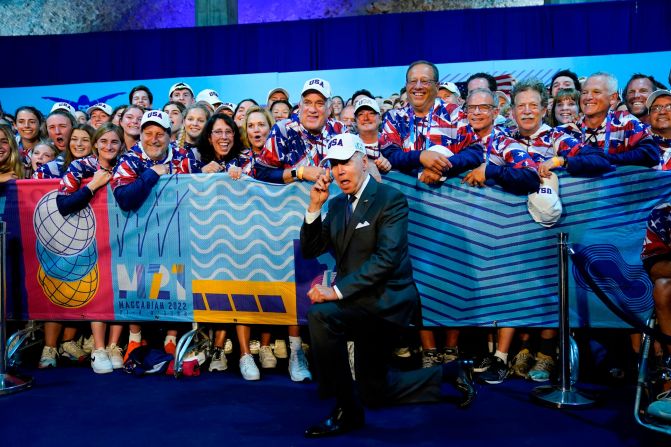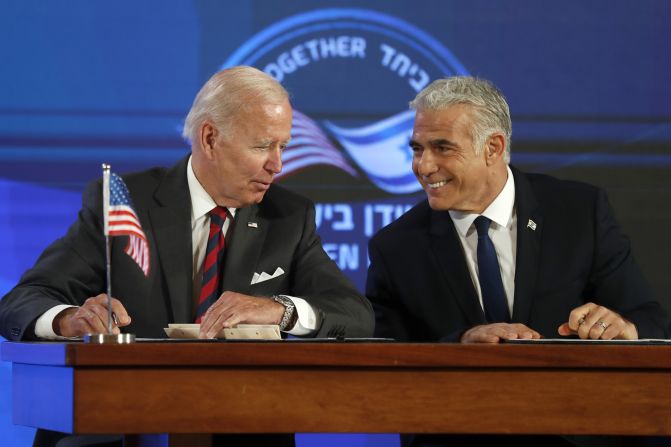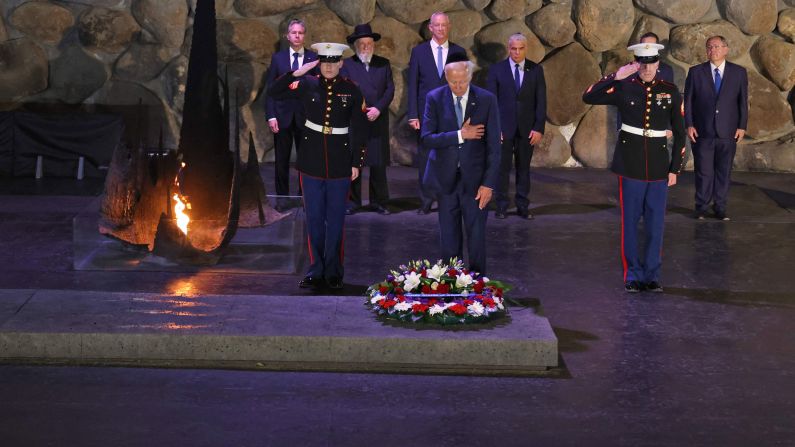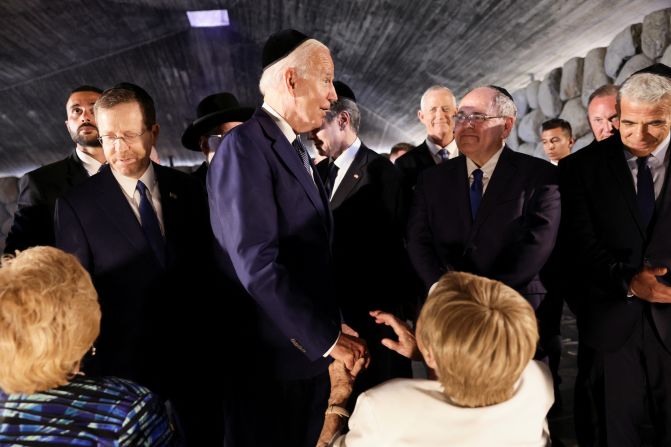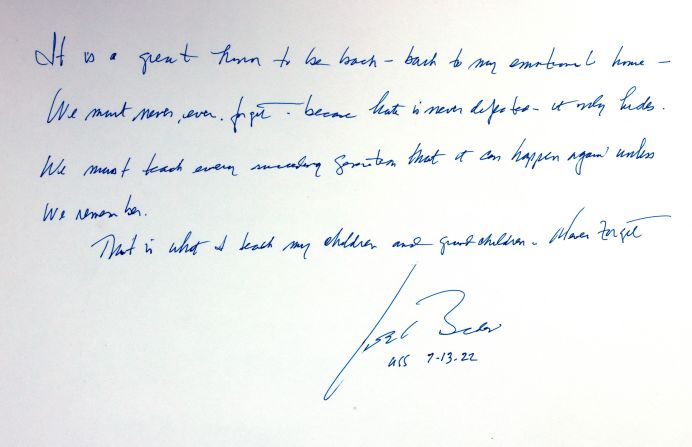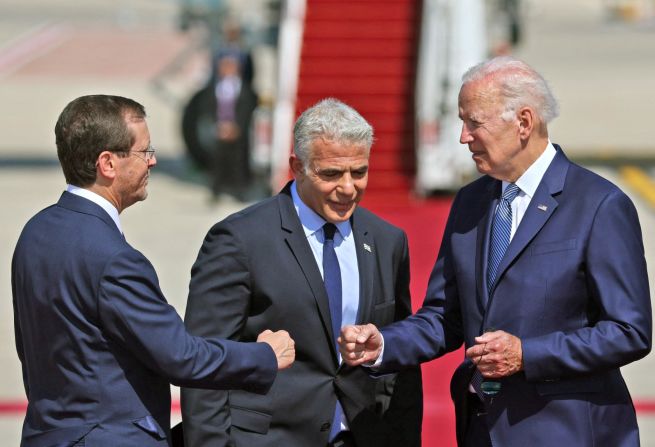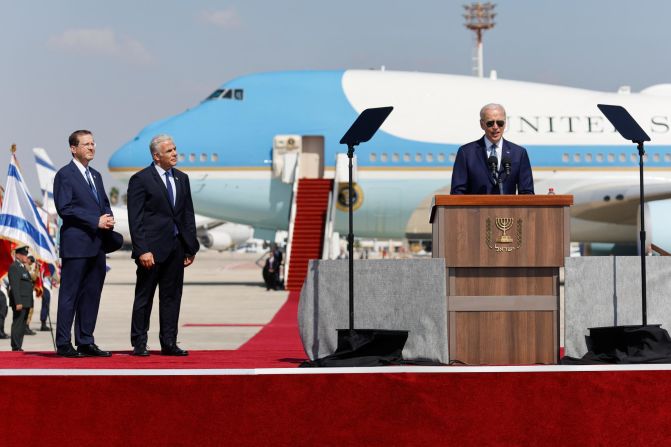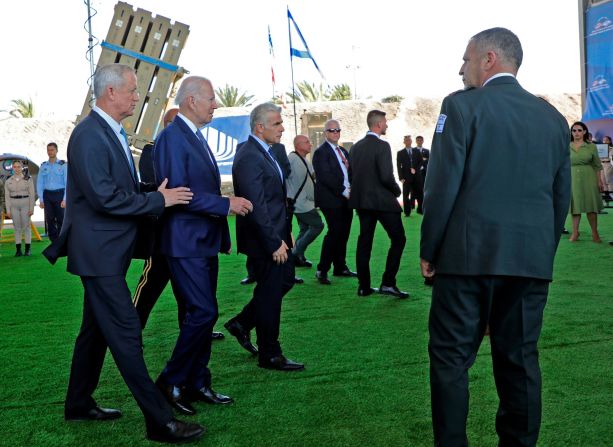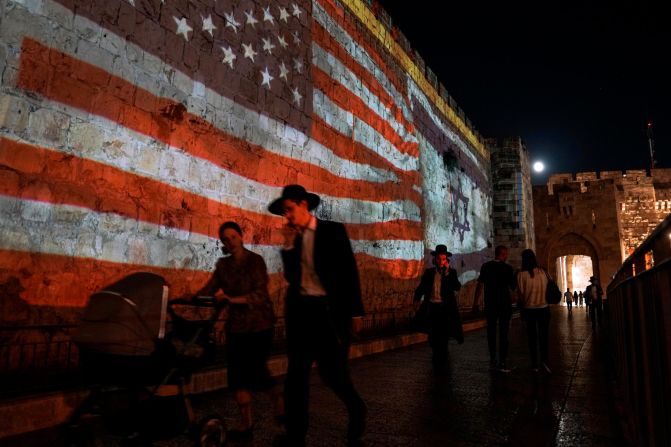President Joe Biden on Friday indicated to Saudi Crown Prince Mohammed bin Salman that he believes the Crown Prince was to blame for the 2018 killing of the journalist Jamal Khashoggi, even as Biden announced several new areas of cooperation aimed at reshaping US-Saudi relations.
The meetings in Jeddah largely seemed to go along with the planned reset of the US relationship with the kingdom after years of strain following Khashoggi’s death. But even more than the policy announcements and the formal discussions, it was the personal interactions between the US President – who once promised to make Saudi Arabia a “pariah” – and the kingdom’s de facto ruler that drew the most attention.
The President was fiercely criticized for fist bumping the Crown Prince during their first in person interaction by human rights groups and fellow Democrats, as well as the publisher of the Washington Post. Those images of Biden and the Crown Prince, also known as MBS, were quickly promoted by the Saudi government, including on Saudi state TV and Twitter.
Biden came to Jeddah seeking solutions to one of his top political problems at home – high gas prices – as diplomacy with the kingdom and other allies in the Middle East was seen as one of the few routes he could take to ease the pain at the pump.
Critics argued the fist bump validated bin Salman on the world stage just over a year after the US declassified an intelligence report concluding the Crown Prince personally ordered Khashoggi’s killing. Washington Post publisher Fred Ryan said Biden’s fist bump was “shameful” because it “projected a level of intimacy and comfort that delivers to MBS the unwarranted redemption he has been desperately seeking.”
It was also a stunning gesture for a President who argued on the campaign trail that he would make Saudi Arabia “the pariah that they are” on the world stage and “make them pay the price.”
But the President said he was “straightforward and direct in discussing” Khashoggi with the Crown Prince on Friday, and said “I made my view crystal clear.”
“For an American President to be silent on the issue of human rights is inconsistent with who we are and who I am. I’ll always stand up for our values,” Biden told reporters after his meetings with Saudi leadership.
Biden said the Crown Prince again denied his involvement in the murder when he raised the issue with him.
“I indicated I thought he was,” Biden said.
In pictures: Biden's trip to the Middle East
Grisly death hangs over Biden’s meetings
Khashoggi, a Saudi journalist who was based in the US, was a fierce critic of Saudi rulers and was killed at a consulate in Istanbul in 2018. Turkish officials said at the time the journalist was beaten, tortured and dismembered.
Ahead of their hours-long meeting, bin Salman on Friday ignored questions from reporters about whether he would apologize to Khashoggi’s family, and Biden did not answer whether he still considered Saudi Arabia a “pariah.”
Biden attended a formal meeting with Saudi King Salman, but – given the king’s deteriorating health – the working session was conducted by the Crown Prince.
White House officials had accepted they would be heavily criticized for the meeting, including by members of Biden’s own party, but decided to move ahead because they saw it as the most practical option, acknowledging it was much easier to work with the Saudis than without them.
The President repeatedly defended his decision to travel to Saudi Arabia and meet with MBS, maintaining his administration wants to lead in the region and not create a vacuum for Russia and China to fill.
Biden had stopped short of committing to raise Khashoggi’s murder directly with leaders in Saudi Arabia and said he “always” brings up human rights and that his views on the murder have been “absolutely, positively clear.” US officials had told CNN ahead of the trip that Biden was expected to raise Khashoggi with MBS.
There was much speculation ahead of the trip whether Biden would shake the Crown Prince’s hand or be pictured with him. That speculation only grew when the White House said the President was looking to reduce contact with others amid the spread of a transmissible subvariant of the Omicron variant of Covid-19, and would be offering fist bumps instead of hand shakes.
A White House spokeswoman denied the guidance was issued in order to give Biden an excuse to avoid shaking MBS’ hand when he arrived in Jeddah. Biden noticeably shook hands on multiple occasions during his two days in Israel, which only added to the scrutiny of his first greeting with MBS.
For weeks, Biden and other White House officials had tried to downplay his meeting with the Crown Prince. The White House did not officially acknowledge Biden will be meeting directly with MBS until publishing the President’s schedule the night before.
The decision to meet with MBS, as well as the fist bump, was criticized by Biden’s fellow Democrats.
Democratic Rep. Adam Schiff of California had sharp words for Biden and tweeted, “If we ever needed a visual reminder of the continuing grip oil-rich autocrats have on U.S. foreign policy in the Middle East, we got it today. One fist bump is worth a thousand words.”
Rep. Tom Malinowski of New Jersey said in an interview on CNN’s “Newsroom” that though he believed Biden has been “honest, unlike his predecessor” about Saudi Arabia’s involvement in Khashoggi’s murder, “I’m still not entirely comfortable with the image of this meeting.”
White House announces policy agreements with Saudis
While no explicit announcement on raising oil production is expected immediately after Biden leaves Jeddah, officials anticipate one could be announced in the coming weeks, in addition to progress on the Yemen ceasefire. Biden’s working visit with MBS is seen as a chance to reset the relationship, and officials say, depending on how the meeting goes, Biden could begin communicating with MBS directly during calls, which he has declined to do so far.
Overnight, Saudi Arabia confirmed an expected announcement that its airspace would be opened to Israeli airlines. Biden hailed the “historic decision” that followed “months of steady diplomacy,” noting he would become the first US President to fly from Israel to Saudi Arabia.
The trip comes amid high gas prices and widespread inflation in the US and across the globe, in part due to Russia’s invasion of Ukraine, though the President and other officials have dismissed Saudi Arabia’s rich oil supply as a key motivator for the trip. The US praised Saudi Arabia for its commitment “to support global oil market balancing for sustained economic growth,” a White House official said, pointing to the step as a move that would drive prices down over the coming weeks.
“We have welcomed the increase in production levels 50% above what was planned for July and August. These steps and further steps that we anticipate over the coming weeks have and will help stabilize markets considerably,” the official said.
The two countries will also sign a memorandum of cooperation on 5G and 6G technology, part of the administration’s push toward expanding infrastructure across the globe. It will “connect US and Saudi technology companies in the advancement and deployment of 5G using open, virtualized, and cloud-based radio access networks and the development of 6G through similar technologies.”
The set of announcements also touts sustaining and extending the United Nations-mediated truce in the war in Yemen.
“President Biden welcomed Saudi Arabia’s strong commitment to the truce, particularly leading, in tandem with the Yemen government, in helping to resume direct commercial flights from Sana’a to Amman and Cairo for the first time in seven years and supporting Yemen’s Presidential Leadership Council, which will help improve basic services and economic stability to ease the suffering of Yemenis,” the official said.
The US and Saudi Arabia also signed a memorandum of understanding between the US Department of Health and Human Services and the Saudi Ministry of Health on public health. The two countries will collaborate on “health information systems, capacity building in the delivery of health services, disease surveillance, emerging infectious diseases, addressing the health-related concerns of women and special needs populations, and public policies oriented to disease prevention and health promotion,” the official said.
There will also be strengthened cooperation on clean energy, with Saudi investments to combat climate change, and an agreement on cybersecurity where the two countries will share information about threats and collaborate on best practices, as well as cooperation on space exploration, per the official.
Biden also welcomed Saudi Arabia efforts to strengthen relations with Iraq, particularly in areas to help fortify the Iraqi power grid by linking it with Saudi and Gulf Cooperation Council countries, the official said.
This story has been updated with additional developments on Friday.




